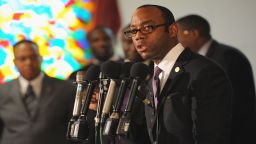Editor’s Note: Alan Khazei is co-founder of the national service nonprofit City Year, Service Year Alliance and Democracy Entrepreneurs. He served on the Commission on National and Community Service and is a candidate for Congress in Massachusetts’ 4th district. Cornell William Brooks is Hauser Professor of the Practice of Nonprofit Organizations and professor of the Practice of Public Leadership and Social Justice at the Harvard Kennedy School and director of The William Monroe Trotter Collaborative for Social Justice at the school’s Center for Public Leadership. Brooks is the former president and CEO of the NAACP. The views expressed in this commentary belong to the authors. View more opinion at CNN.
This is an American moment for radical truth telling, precipitated by the brutal, merciless and videotaped killing of George Floyd as well as the protests in his name. Millions of Americans have taken to the streets across 50 states, the nation’s capital and around the globe to tell the unvarnished truth about police brutality and demand an end to police violence. Amid a renewed national conversation about racism, more Americans are beginning to listen and take action.


And yet with more than 18,000 police departments among 19,000 municipalities across America, implementing only local solutions to police violence will take many more years, hashtags and – unconscionably –human lives. This moment demands not incremental and local reforms, but the national will and moral urgency for bold, decisive action. To meet this challenge, we must take the radical truth telling we hear in the streets and online into town halls, city halls, state legislatures and the capitol through the creation of an American Truth, Justice and Reconciliation Commission.
Martin Luther King Jr. warned America about the “paralysis of analysis” and that the word “wait” “has almost always meant ‘never’” when it comes to addressing systemic racism. To be clear, this commission would not be meant to delay the demands for change but rather to amplify, intensify and expedite the transformation of those demands into law, policy and cultural change.
In the days following the toppling of apartheid, South Africa’s Truth and Reconciliation Commission played a critical role in transforming its government – and society at large – from a racist regime upheld by a white minority to a democratic, Black majority-ruled nation. The commission sought to gather evidence of human rights abuses and encouraged public participation in a nationwide dialogue. While there are many differences between the fall of apartheid in South Africa and what we currently face in the US, we should uphold the essence of this process and create our own commission to openly and honestly confront the truth about our country’s racist history.
We strongly support Rep. Barbara Lee’s proposal to create a commission to examine the legacy of slavery and urge members from both parties to embrace it. Here are suggestions for how this commission could work: it should be funded by Congress with a $50 million appropriation, with members that include a diverse group of leaders with strong moral authority. That can include leaders from different faith traditions and those with diverse lived experiences, including people living in poverty, those who have experienced the harshest effects of our racist, anti-Black criminal justice system and young people who are at the forefront of calling for change.
The mission of an American Truth, Justice and Reconciliation Commission should be two-fold. First, the commission would be tasked with exposing the United States’ racist structures and their negative impacts. To do this, the commission could hold public hearings across the country to hear testimonies and gather evidence from Americans of all backgrounds – rural or urban, northern or southern or professional, working class or low-income.
The ongoing narrative of the George Floyd protests – those informal stories of injustice and demands for justice shared in the demonstrations – would be turned into formal legislative testimony including stories of police brutality, citizen recommendations and the perspectives of faith communities. Through hearings in Washington and field hearings in cities across America, the commission would empower people to bear witness to police violence and speak truth to power in corridors of power. Academics and expert witnesses would also be called to weigh in to provide data and offer legal and policy analysis.
Second, the commission would be charged with delivering a set of sweeping recommendations for transformational change in our criminal justice, education, health care and economic systems. These recommendations would include new laws and regulations at the federal, state and municipal levels, as well as policies for the government and private sector to promote racial justice. The recommendations would include aggressive deadlines because talk alone is not enough.
The success of an American Truth, Justice and Reconciliation Commission will require presidential leadership and bipartisan congressional support. We are under no illusions that our current President has the disposition, inclination or credibility to lead the way. If elected, President Joe Biden could establish the commission and make it a centerpiece of his administration and leadership.
We face a moment in our country’s history that could lead to real, lasting and transformative change. But to get there, we need to harness the energy of this extraordinary awakening and create an institutional mechanism that not only keeps the momentum going, but also establishes a pathway to uncover the truths of our racially unjust society, achieve meaningful racial reconciliation and recommend sweeping changes to address systemic racism. As James Baldwin said, “Not everything that is faced can be changed, but nothing can be changed until it is faced.”

